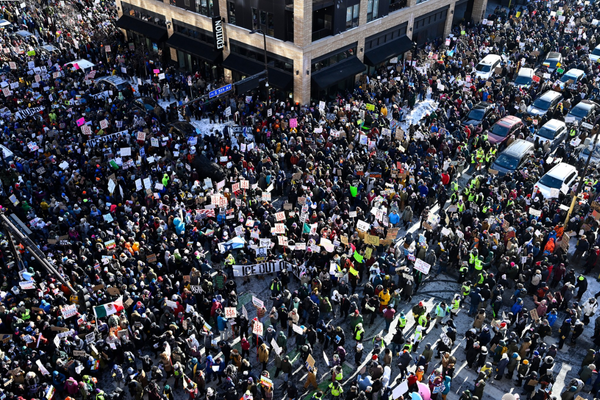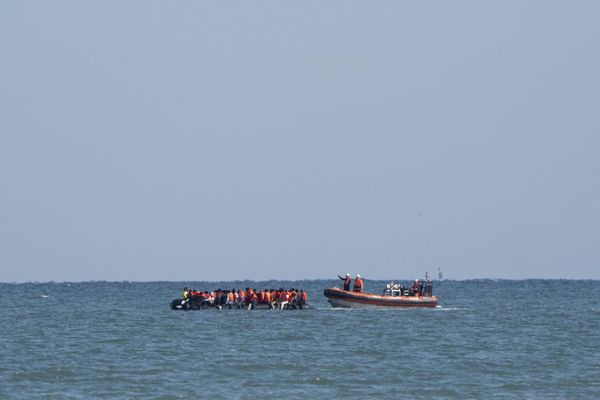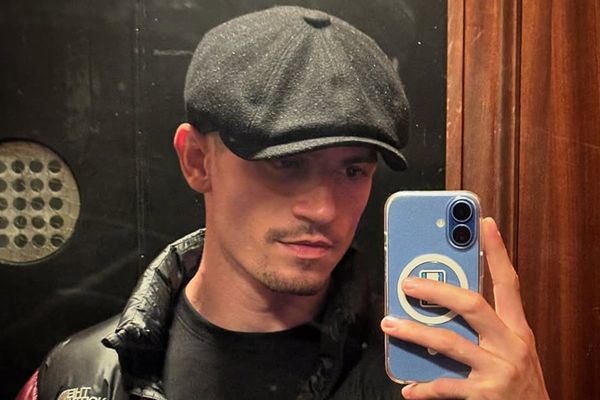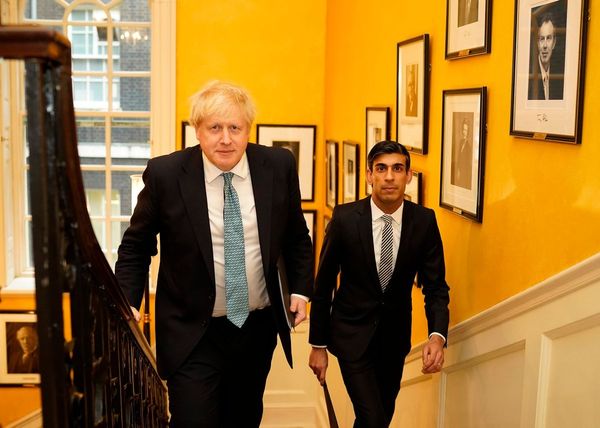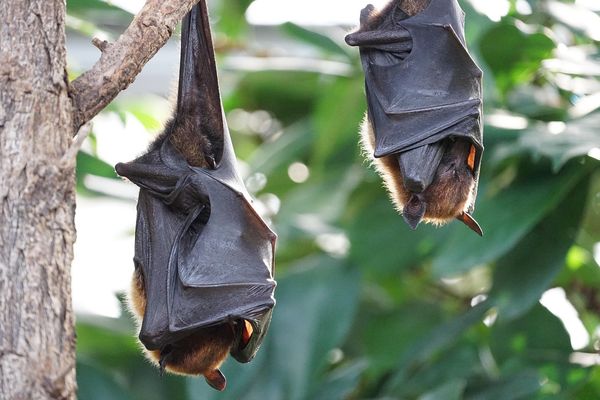
“When the players went out, they were like ‘pfff, what a great atmosphere’,” Xabi Alonso said at the close of a night so long-awaited many didn’t make it, and many of those who did were actually experiencing primera for the first time. At the north end of the Carlos Tartiere, Real Oviedo’s fans prepared to reveal another gigantic work of art, 1,800 square metres of tifo sent tumbling across the terrace. Beneath the west stand, the city’s bagpipers got ready to play the Asturian anthem. Near the tunnel, Elena and Carlos, the embodiment of an entire generation, waited to kick it all off. And everywhere, in the city and the stadium, there was blue. Into it all, Real Madrid stepped on Sunday night. And, their manager said, it was “spectacular”.
They had missed it. The last time Madrid had been to Oviedo was 10 June 2001, the last first division game in the Tartiere. That day, a fortnight after Oviedo had beaten Barcelona at the Camp Nou, they drew 1-1 with Vicente del Bosque’s side, Santi Solari scoring. “I prefer to forget it,” Veljko Paunovic says, but he can’t. “We missed so many chances; I had two, one hit the bar.” A win and Oviedo would have been safe; instead, seven days later they lost 4-2 at Mallorca and were relegated. It took 24 years to return to primera, nine days more to do so at home. Coincidence, or perhaps a kind of closure, decided it would be against the same team as the last time, 8,841 days later.
Another 168 teams have been there since, many of whom you probably haven’t heard of, all of which Oviedo can now be proud of: Pumarín, Atlético Astorga, Colloto. Montañeros, Condal de Noreña, Real Titánico. Or tiny CD Mosconia, even though there may be no goal that meant as much as the one Kily Álvarez scored against them. When Madrid last came, Paunovic was an Oviedo midfielder; now he is the manager, the man who won promotion to primera in June, immediately messaging the teammates who went down with him in 2001. “It’s been very emotional,” he said, “this is like closing a circle, repaying a debt. It transcends football.”
Fans overlooking the Carlos Tartiere Stadium.
Flares are lit as supporters descend on the ground.
Arriving ahead of kick-off for the club’s first top-flight match in 24 years.
Walking into the stadium.
Football always does, and on Sunday night it was felt, even by Madrid’s players. This is not just once-big team gets relegated and takes too long to return, so long that loads of the Oviedo fans who sang about doing so never saw them play in primera in the first place and countless more didn’t live to see it happen. It is not that Oviedo fell in 2001, it is that they kept falling. Not just that they are in the first division now but that they are, not just that they might not have made it back but that they might not have made it at all. The last time they faced Madrid was against their C team. And it might have been the last time they ever faced anyone.
Before this weekend’s game Oviedo produced a matchday poster that portrayed the two teams as old acquaintances crossing paths again. “Tell me, how’s it been going … ” the message says. At the top of the image, Real Madrid lift another European Cup. At the bottom, Real Oviedo’s former goalkeeper Rafa Ponzo stands in the mud. Since 2001, while Oviedo have been away, Madrid have won 11 leagues and seven Champions Leagues. Oviedo have been down to the second division, second division b – an 82-team league of four regional divisions – and tercera, where there are more than 350 teams across 17 divisions. They have been relegated two divisions in the same season, had an owner on the run from Interpol and politicians trying to kill them off. Twice they were on the verge of folding, gone for ever. Which was when the fans came in, and which is why this was much more than just a promotion, a first division homecoming.
Instead of coming back up after relegation in 2001, they went down again two years on, from the second division to the second division b. Worse, debts spiralled, reaching 7bn pesetas (€42m), the list of creditors headed by the tax office, Betis, bank, and social security. When players reported the club for unpaid salaries, an extra division was added to their fall, sent down to tercera. They also started the following season on minus-six points. If they started it at all. The headline in one local paper said it all. “It’s over.”
“All that’s left is to sign the death certificate,” said the local mayor, Gabino de Lorenzo, and he was keen to do that. “Given the imminent disappearance of professional football in the city, de jure and de facto,” a draft agreement began, the council invited the local amateur club Astur to take their place. Astur changed their name to Oviedo ACF, their colours to Oviedo’s colours, their badge to something near-identical to Oviedo’s. They signed Oviedo’s record appearance maker. The council promised Astur a €91,000 subsidy and the use of the Tartiere. Newspapers in the mayor’s pocket backed the project, talked up full houses that weren’t full and popular support that didn’t exist, something tin-pot dictator in the tone. Sample line: “Gabino received an improvised homage with a huge ovation when he arrived at the ground”.
Bagpipers play the Asturian anthem before the match.
A proud supporter.
A huge tifo unfurled before kick-off.
Passion in the stands.
As it turned out, it was what Oviedo needed – something to go to war for, a cause to defend, anger to fuel it, an enemy to take on. “The poison cured you,” as one Oviedo song goes. Astur were the clone, the freak; Real Oviedo were the real Oviedo, and there was a reawakening, a rebellion.
Led by president Manolo Lafuente fans answered the call: they brought generators, cut grass, painted stands, and started calling season ticket holders one by one, putting together homemade membership cards. Eventually there were 11,700 of them. In their entire time down in what they came to call the “mud” – a word used metaphorically and literally – Oviedo never had less than 10,000. They built a team too, with a skeleton staff, only six of 40 remaining. The entire squad had gone. So had youth players Juan Mata, Santi Cazorla and Adrián López, forced out amid the chaos. They had no hot water, no electricity and no players but within two weeks they had a team and it was theirs, an identity forged, a sense of belonging. It was precarious but they played, starting with that win over CD Mosconia, and they were proud. Defeated, the city council eventually quietly dropped Astur.
Then it went wrong again. A new owner arrived in 2006, an apparent saviour. Wanted for two counts of fraud, Alberto González went missing. In 2012 Oviedo were again on the verge of folding. An interim board – heroes all – had a plan, one last roll of the dice. Again fans rose, backed this time by supporters from around the world. An SOS went out and they responded. In the midst of it, Oviedo played Real Madrid C. That day thousands marched to the ground. 20,500 were at the game, in the third tier. Real Madrid C’s players brought shares. Their club underwrote €100,000 worth. In two weeks, 36,962 people in 86 countries had brought shares. Watching the phenomenon spread, the Mexican billionaire Carlos Slim brought shares, taking Oviedo over the threshold, its future secured. In 2022, some of those were sold to the Pachuca group.
In 2003, as it left Oviedo to die, the city council had declared that the Astur project would “return football in Oviedo to the place it deserves to be”; 22 years on, 24 years after they departed the top flight, it happened: not the way they wanted, but the way everyone else did. Sprinting on to the pitch was Cazorla who had been forced out by the crisis and finally played his first game for his boyhood club at 38, then took them to primera at 40. On local radio Miguel Fernandi, the voice of Oviedo through the muddy years, met the playoff final whistle with: “You tried to kill us, you tried to assassinate us, you tried to replace us, and 24 years later, we’re in primera.”
Oviedo 0-3 Real Madrid, Villarreal 5-0 Girona, Real Sociedad 2-2 Espanyol, Osasuna 1-0 Valencia, Mallorca 1-1 Celta Vigo, Atlético Madrid 1-1 Elche, Levante 2-3 Barcelona, Real Betis 1-0 Alves
Where, on Sunday night, they lost 3-0 against Real Madrid. Where they were always likely to but might not have done, but for Kwasi Sibo’s shot coming off a post in the 81st minute with the score at 1-0. “I was so mad at myself; it matters to me personally and everyone else,” he said. But where it wasn’t really about that; it was about the journey, about being. About this division not just being a place to play but a statement, meeting Madrid not just a match but a symbol: of survival, of overcoming, of never having abandoned, reclaiming a place. About knowing where you come from, about winning. Not a match or even a promotion, not really, but something more: an identity, meaning. Now they would enjoy this.
Oviedo’s Kwasi Sibo in front of Real Madrid’s Aurélien Tchouaméni.
Oviedo’s Santi Cazorla runs while the Real coach Xabi Alonso watches.
Real Madrid’s Kylian Mbappé scores their first goal.
Oviedo players after the match.
About Elena and Carlos, born in 2001, members ever since, babies then and adults now, performing the honorary kick-off, representing a new generation. About Armando Barbón, Peter Dubovsky and Pelayo Novo, players who tragically passed away too young and the thousands of fans who were missed on Sunday too. About the tifo and the sea of blue, the old T-shirts everywhere, cheap and tatty now but priceless: “I didn’t abandon Oviedo in tercera”. About the tears, the noise, the anthem and the chants, the old one that insists we’ll be back dropped now. About everyone else embracing this, even the opposition: if Oviedo have missed the first division, the first division has missed them too, Alonso hugging Cazorla at full time. “I was quite emotional because I know what this moment is, what it means to him: the atmosphere was amazing,” Madrid’s manager said. Looking up at the stands at the final whistle, the Oviedo goalkeeper Aarón Escandell has been beaten and he will talk about the game but first he has something simple to say: “Thank you.”
| Pos | Team | P | GD | Pts |
|---|---|---|---|---|
| 1 | Villarreal | 2 | 7 | 6 |
| 2 | Barcelona | 2 | 4 | 6 |
| 3 | Real Madrid | 2 | 4 | 6 |
| 4 | Espanyol | 2 | 1 | 4 |
| 5 | Real Betis | 2 | 1 | 4 |
| 6 | Rayo Vallecano | 1 | 2 | 3 |
| 7 | Getafe | 1 | 2 | 3 |
| 8 | Athletic Bilbao | 1 | 1 | 3 |
| 9 | Alaves | 2 | 0 | 3 |
| 10 | Osasuna | 2 | 0 | 3 |
| 11 | Real Sociedad | 2 | 0 | 2 |
| 12 | Elche | 2 | 0 | 2 |
| 13 | Atletico Madrid | 2 | -1 | 1 |
| 14 | Valencia | 2 | -1 | 1 |
| 15 | Celta Vigo | 2 | -2 | 1 |
| 16 | Mallorca | 2 | -3 | 1 |
| 17 | Sevilla | 1 | -1 | 0 |
| 18 | Levante | 2 | -2 | 0 |
| 19 | Oviedo | 2 | -5 | 0 |
| 20 | Girona | 2 | -7 | 0 |
